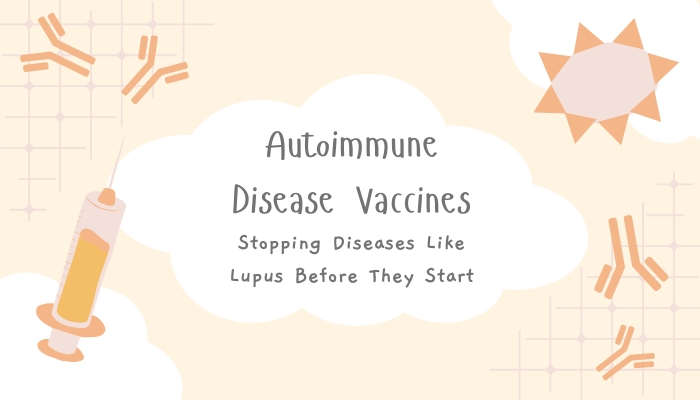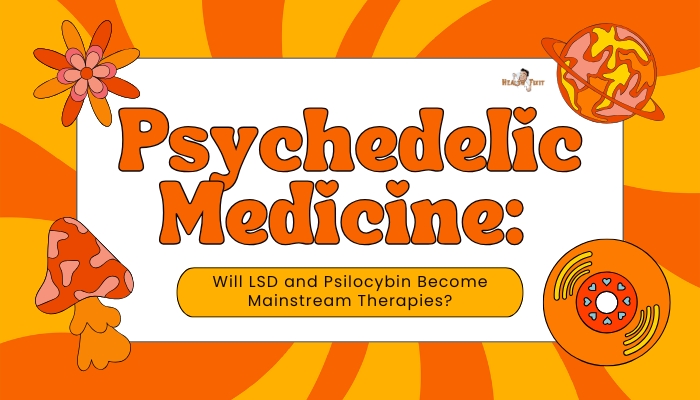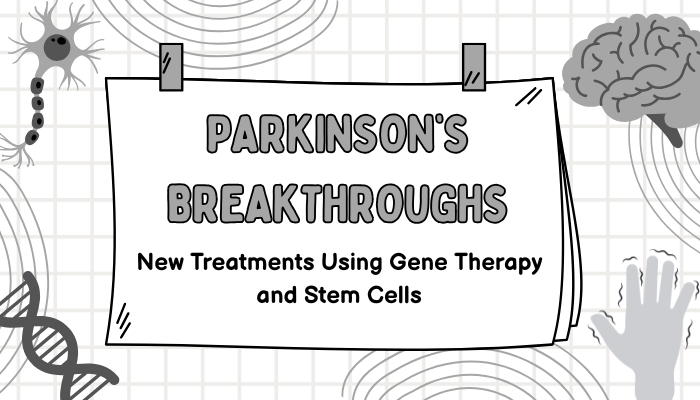Introduction
Autoimmune diseases such as systemic lupus erythematosus (SLE), rheumatoid arthritis, and type 1 diabetes arise when the immune system mistakenly attacks the body’s own tissues.
Conventional treatments often rely on immunosuppressants to quell flare-ups, but side effects and incomplete disease control remain problematic.
Now, researchers pursue a bold strategy: vaccines that selectively re-educate the immune system, preventing or mitigating autoimmune disease at its source.
This approach—using targeted immunotherapies—aims to achieve robust, long-lasting remission without full-scale immune suppression.
Here, we explore how these innovative autoimmune vaccines might one day stop conditions like lupus before clinical symptoms even begin.
The Rationale for Autoimmune Vaccines
Immune Tolerance Disruption in Autoimmunity
Under healthy conditions, the immune system distinguishes self from foreign. However, in autoimmune disorders, tolerance mechanisms break down.
Self-reactive T or B cells become activated, producing autoantibodies or cytotoxic responses that damage tissues. Traditional treatments target broad immunosuppression—blunting disease activity but exposing patients to infection or malignancy risks.
Restoring Tolerance
Autoimmune vaccines aim to restore or boost immune tolerance to specific self-antigens relevant to a disease. By presenting key epitopes (protein fragments or peptides) from self-proteins in a controlled manner, these vaccines retrain T cells or B cells to ignore or actively suppress harmful autoreactive responses. Achieving this could eliminate flares or halt disease progression at the earliest stage.
How Autoimmune Vaccines Work
Antigen-Specific Immunotherapy
The core concept is akin to allergy desensitization:
- Identifying Target Antigens: For lupus, it might be nuclear proteins (e.g., dsDNA or histones) recognized in SLE; for type 1 diabetes, insulin or GAD peptides.
- Formulating Peptides or Protein Fragments: The vaccine contains the relevant self-antigen, either as synthetic peptides or genetically engineered constructs.
- Modulating Immune Response: Co-delivering adjuvants or using specialized delivery systems that prime the immune system toward regulatory T cell (Treg) induction and away from pro-inflammatory pathways.
Treg Induction and T Cell Anergy
Some prototypes rely on dendritic cells loaded with disease-related peptides. These specially conditioned dendritic cells present the antigen to T cells in a tolerogenic manner—boosting Tregs. Tregs can quell autoreactive lymphocytes, sustaining remission.
DNA and mRNA Vaccines
Drawing from cancer or infectious disease vaccine technology, scientists experiment with DNA-based or mRNA vaccines encoding auto-antigens. By controlling expression levels and context, they attempt to skew immune reactions toward tolerance, not aggression.
Targeting Specific Diseases
Lupus (SLE)
Lupus involves widespread autoantibodies against nuclear components. Early vaccine studies explore small nuclear ribonucleoprotein–based peptides or double-stranded DNA–mimicking constructs aimed at damping SLE flares. Animal models show decreased autoantibody titers and organ damage when administered prophylactically.
Type 1 Diabetes
In type 1 diabetes, T cells destroy insulin-producing pancreatic beta cells. Trials in at-risk individuals have tested insulin or GAD peptides to boost tolerance,
staving off disease onset. Though results vary, some subgroups demonstrate delayed progression or reduced autoimmunity.
Rheumatoid Arthritis
RA is driven by auto-reactive T/B cells primarily attacking joint synovia. Vaccines containing citrullinated peptides or cartilage-specific antigens attempt to induce tolerance. Studies on collagen-induced arthritis in animals exhibit encouraging anti-inflammatory benefits.
Challenges and Considerations
Complex Immunopathology
Autoimmune diseases often involve multiple autoantigens, dynamic epitope spreading, and interplay of various immune cells. A single antigen-based approach might not suffice. Multifaceted or personalized vaccines could be needed for truly effective results.
Identifying Relevant Antigens
In some conditions, the exact self-antigen or epitope is unclear or differs among patients. Better biomarkers or high-throughput screenings can pinpoint the key autoantigenic targets for each individual.
Tolerance vs. Immunosuppression
Striking a balance is critical. A vaccine must downregulate harmful autoreactive cells without disabling beneficial immunity to infections. Achieving antigen-specific tolerance remains a delicate immunological feat.
Timing
Prevention is easier if introduced before or at early disease stages. Once full-blown autoimmunity is entrenched, reversing it via immunotherapy may be harder, requiring additional immune-modifying treatments.
Current Status and Future Directions
Animal Model Successes
Multiple proof-of-concept studies confirm that prophylactic vaccination in murine lupus or arthritis models slows disease onset and lowers autoimmune markers. The next step is more robust preclinical data in larger animals, ensuring safety and reproducibility.
Limited Human Trials
Some pilot trials in T1D or RA testing specific peptides or cellular vaccines show partial success, but not universal or dramatic. Larger, well-powered phase II/III trials are needed to refine protocols and identify responsive patient subgroups.
Personalized Neoantigen Approaches
Similar to cancer vaccines, the future might revolve around neoantigens—unique mutated peptides or aberrant self-antigens—for truly personalized therapies
. Next-generation sequencing and advanced epitope prediction can identify tailor-made “autoimmune vaccine cocktails” for each patient.
Implications for Patients and Providers
Preventive Care for High-Risk Groups
For individuals with strong family histories or early biomarkers (like autoantibodies in T1D), targeted vaccines might one day hold disease at bay. Genetic testing plus close immunological monitoring can pinpoint prime windows for prophylactic vaccination.
Combining with Existing Therapies
Even partial success might lighten the load of immunosuppressants, lowering risk of infections or side effects. In advanced disease, synergy with biologics (anti-TNF, anti-B cell therapy) or small-molecule immunomodulators can further improve outcomes.
Ethical and Regulatory Path
If prophylactic vaccines for healthy but at-risk individuals become feasible, balancing risk–benefit in subclinical populations demands thorough ethical oversight.
Regulators require robust evidence of safety and long-term effect, to ensure no inadvertent harm from artificially altering immune tolerance.
Conclusion
Autoimmune disease vaccines—which reprogram the immune system to spare the body’s own tissues—offer a transformative vision for conditions like lupus, type 1 diabetes, and rheumatoid arthritis. Progress in epitope identification,
dendritic cell engineering, or DNA/mRNA technology is paving the path for safer, more targeted solutions.
While major hurdles remain—especially in understanding complex disease triggers and achieving lasting tolerance—ongoing trials hint that prophylactic or remission-inducing vaccines could become realistic
. If successful, these immunotherapies might usher in a future where autoimmune diseases can be prevented or mitigated from the start, offering renewed hope to millions worldwide.
References
- Davidson A, Diamond B. Autoimmune diseases. N Engl J Med. 2001;345(5):340–350.
- Tostanoski LH, Chiu YJ, Gammon JM, et al. Reprogramming the immune system to treat autoimmune disease with antigen-specific therapies. Nat Rev Rheumatol. 2020;16(9):491–505.
- Daley SR, Carroll HP, O’Keeffe M. T cell tolerance in autoimmune diseases. Front Immunol. 2020;11:1672.
- Tsai S, Shameli A, Santamaria P. Reversal of autoimmunity by boosting memory-like autoregulatory T cells. Immunity. 2008;28(6):1–12.
- Skyberg JA, Baker PE, Gregg RK. Approaches to antigen-specific immunotherapy for type 1 diabetes. Hum Vaccin Immunother. 2019;15(1):50–64.
- Cutter G, Polo JM, Freedman MS, et al. Lessons from immunomodulatory therapy trials in autoimmune diseases. Lancet. 2013;382(9892):146–156.
- Shlomchik MJ. Sites of autoantigen expression and drug design. Immunol Rev. 2020;294(1):71–85.
- Passeri L, et al. Vaccine-based therapy for SLE: potential synergies with biologics. Nat Rev Rheumatol. 2021;17(8):483–494.
- Galeotti C, Bayry J, Kaveri SV. Autoimmune responses in immunocompetent and immunodeficient hosts. Curr Opin Immunol. 2015;37:1–7.
- Masteller EL, Warner MR, Tang Q. Antigen-specific Treg therapy for autoimmune disease: from bench to bedside. Curr Opin Immunol. 2019;61:46–52.







